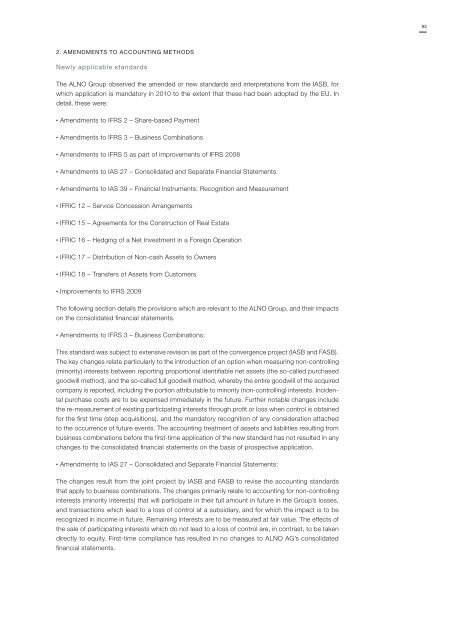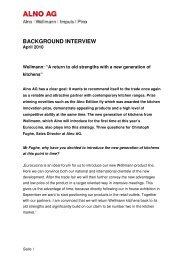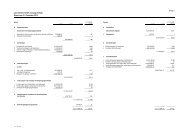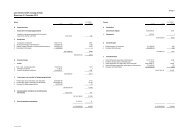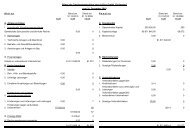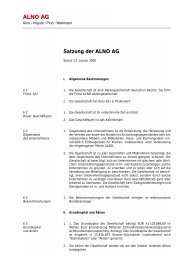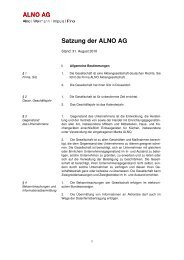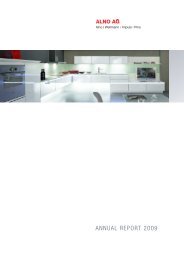100 % FUTURE - ALNO
100 % FUTURE - ALNO
100 % FUTURE - ALNO
You also want an ePaper? Increase the reach of your titles
YUMPU automatically turns print PDFs into web optimized ePapers that Google loves.
93<br />
2. AMENDMENTS TO ACCOUNTING METHODS<br />
Newly applicable standards<br />
The <strong>ALNO</strong> Group observed the amended or new standards and interpretations from the IASB, for<br />
which application is mandatory in 2010 to the extent that these had been adopted by the EU. In<br />
detail, these were:<br />
• Amendments to IFRS 2 – Share-based Payment<br />
• Amendments to IFRS 3 – Business Combinations<br />
• Amendments to IFRS 5 as part of improvements of IFRS 2008<br />
• Amendments to IAS 27 – Consolidated and Separate Financial Statements<br />
• Amendments to IAS 39 – Financial Instruments: Recognition and Measurement<br />
• IFRIC 12 – Service Concession Arrangements<br />
• IFRIC 15 – Agreements for the Construction of Real Estate<br />
• IFRIC 16 – Hedging of a Net Investment in a Foreign Operation<br />
• IFRIC 17 – Distribution of Non-cash Assets to Owners<br />
• IFRIC 18 – Transfers of Assets from Customers<br />
• Improvements to IFRS 2009<br />
The following section details the provisions which are relevant to the <strong>ALNO</strong> Group, and their impacts<br />
on the consolidated financial statements.<br />
• Amendments to IFRS 3 – Business Combinations:<br />
This standard was subject to extensive revision as part of the convergence project (IASB and FASB).<br />
The key changes relate particularly to the introduction of an option when measuring non-controlling<br />
(minority) interests between reporting proportional identifiable net assets (the so-called purchased<br />
goodwill method), and the so-called full goodwill method, whereby the entire goodwill of the acquired<br />
company is reported, including the portion attributable to minority (non-controlling) interests. Incidental<br />
purchase costs are to be expensed immediately in the future. Further notable changes include<br />
the re-measurement of existing participating interests through profit or loss when control is obtained<br />
for the first time (step acquisitions), and the mandatory recognition of any consideration attached<br />
to the occurrence of future events. The accounting treatment of assets and liabilities resulting from<br />
business combinations before the first-time application of the new standard has not resulted in any<br />
changes to the consolidated financial statements on the basis of prospective application.<br />
• Amendments to IAS 27 – Consolidated and Separate Financial Statements:<br />
The changes result from the joint project by IASB and FASB to revise the accounting standards<br />
that apply to business combinations. The changes primarily relate to accounting for non-controlling<br />
interests (minority interests) that will participate in their full amount in future in the Group’s losses,<br />
and transactions which lead to a loss of control at a subsidiary, and for which the impact is to be<br />
recognized in income in future. Remaining interests are to be measured at fair value. The effects of<br />
the sale of participating interests which do not lead to a loss of control are, in contrast, to be taken<br />
directly to equity. First-time compliance has resulted in no changes to <strong>ALNO</strong> AG’s consolidated<br />
financial statements.


